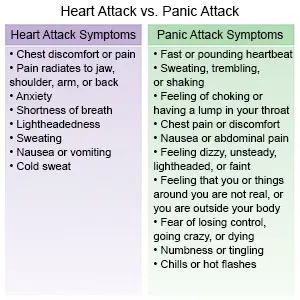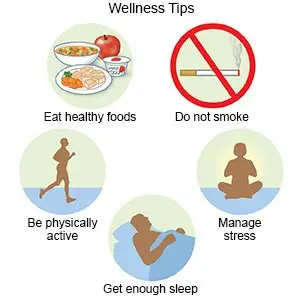What is panic disorder?
Panic disorder is an anxiety disorder that causes you to have sudden panic attacks. A panic attack is a strong feeling of fear or discomfort. The attack starts suddenly, is worst 10 minutes after it starts, and stops within 20 minutes. The attack may have a trigger, or it may happen for no reason. Panic disorder means you had at least 2 panic attacks that had no trigger. The attacks caused you to worry over the next month that you would have more attacks. The attacks or worry about future attacks also change your behavior. For example, you stop going out with friends because you are afraid you will have an attack.
What are the signs and symptoms of a panic attack?
- Chest pain or discomfort, or fast or irregular heartbeats
- Sweating, trembling, lightheartedness, or fainting
- Hyperventilation (breathing so quickly you become dizzy, lightheaded, or faint)
- Shortness of breath, trouble breathing, or a feeling that you are choking or smothering
- Pale or cold skin, chills, or hot flashes
- Nausea, vomiting, or abdominal pain
- A feeling that you are separate from your body
 |
How is panic disorder diagnosed and treated?
Your healthcare provider will ask about your symptoms and when they began. Your provider will ask what triggers your symptoms and if fear of a panic attack limits your daily activities. Tell your provider about any medications you currently take. Tests may be done to check for medical conditions that may be causing your symptoms. Treatment will depend on how severe your anxiety attacks are. The following can help reduce anxiety and panic attacks:
- Medicines , such as antianxiety and antidepressants, may be given to treat panic disorder. You may need to take antidepressants for several weeks before you begin to feel better. Tell your healthcare provider about any side effects or problems you have with your medicine. Sometimes the type or amount of medicine may need to be changed.
- Therapy may be used to help you learn to manage your thoughts and feelings. This can be done alone or in a group. It may also be done with family members or a significant other.
What can I do to manage panic disorder?
- Keep a record of your panic attacks. The record should include each panic attack, how long it lasted, and anything that helped stop it. Bring your record with you every time you see your healthcare providers.
- Manage stress. Stress can trigger a panic attack. Ways to lower your stress level include yoga, meditation, and talking to someone about the stress in your life.
- Exercise as directed. Exercise can reduce stress and help you sleep better. Try to get at least 30 minutes of physical activity on most days of the week. Your healthcare provider can help you create an exercise plan.
- Set a sleep schedule. Too little sleep can increase anxiety. Go to bed at the same time each night and wake up at the same time each morning. Keep your room quiet and free from distractions, such as a television or computer.
- Eat a variety of healthy foods. Healthy foods include fruits, vegetables, low-fat dairy products, lean meats, fish, and beans. Limit sugar. Sugar can increase your symptoms.
- Do not have foods or drinks that contain caffeine. These may include coffee, tea, soda, energy drinks, and chocolate. Caffeine can make anxiety worse or trigger a panic attack.
- Limit alcohol. You may think alcohol makes you calmer, but it is not a safe or effective way to control anxiety. Alcohol can increase anxiety if you drink large amounts or drink often. Ask your healthcare provider how much alcohol is okay for you to drink. A drink of alcohol is 12 ounces of beer, 5 ounces of wine, or 1½ ounces of liquor.
- Do not smoke. Nicotine and other chemicals in cigarettes and cigars can increase anxiety. Ask your healthcare provider for information if you currently smoke and need help to quit. E-cigarettes or smokeless tobacco still contain nicotine. Talk to your healthcare provider before you use these products.
 |
Treatment options
The following list of medications are in some way related to or used in the treatment of this condition.
- Klonopin
- Xanax
- Zoloft
- Ativan
- BuSpar
View more treatment options
Call your local emergency number (911 in the US) if:
- You have any of the following signs of a heart attack:
- Squeezing, pressure, or pain in your chest
- You may also have any of the following:
- Discomfort or pain in your back, neck, jaw, stomach, or arm
- Shortness of breath
- Nausea or vomiting
- Lightheadedness or a sudden cold sweat
When should I call my doctor or therapist?
- You have new or worsening symptoms.
- You have questions or concerns about your condition or care.
Care Agreement
You have the right to help plan your care. Learn about your health condition and how it may be treated. Discuss treatment options with your healthcare providers to decide what care you want to receive. You always have the right to refuse treatment. The above information is an educational aid only. It is not intended as medical advice for individual conditions or treatments. Talk to your doctor, nurse or pharmacist before following any medical regimen to see if it is safe and effective for you.© Copyright Merative 2023 Information is for End User's use only and may not be sold, redistributed or otherwise used for commercial purposes.




